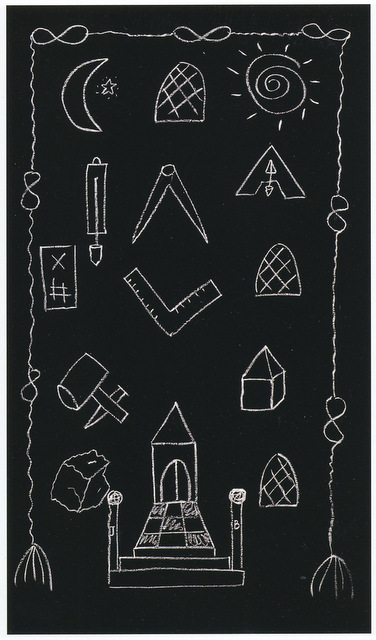Secrets, true and False.
One of the most prevalent ideas that people have of Freemasonry – and indeed of all its variations – is that it is a secret society. All kinds of meanings are attached to this term; the most widespread being that of a mysterious occult organisation aiming to exert secret influence over political events, the social order and power. That is how responsibility for the French Revolution was wrongly attributed to the Freemasons of the 18th Century and how so many appalling events have been explained away as the hidden hand of Freemasonry, a mythical idea, especially typical of Continental Europe which has created so many enemies of Freemasonry and at times given rise to bloody persecutions. Another popular idea of Masonic secrets is that Lodges were nests of intrigue, webs of influence, shady political schemes and wheeling and dealing; their secret teaching and ideology also made them hotbeds of corruption and subversion.
With all due respect to those drawn to the most far-fetched and outlandish explanations, the truth is far simpler and more mundane: Regular Freemasonry has no other secret than that of initiation. Traditional Masonic Constitutions expressly require Masons to be utterly loyal to their country and its lawful authorities. Besides, Regular Freemasonry abstains from involvement in the issues and disputes of the times and adopts no stance whatsoever on non-Masonic issues. So it is far from contemplating involvement in political struggles or scheming to overthrow the social or moral order, let alone placing in power men who can serve its interests. Regular Freemasonry is solely concerned with playing its part, as best it can, as an initiatory society, working upon its initiates, who, through its ritual, symbolism and spirituality, are encouraged to follow the path of spiritual and moral progress offered by the very fact of initiation.
No secret as such is revealed to initiates, no occult plan for changing the world, no theological instruction, no mystic key to mankind and the world. Freemasonry possesses none of these kinds of secrets, so is in no position to pass them on to its members. Yet, it does have its secret, the secret of Masonic experience itself. This cannot even be communicated because it cannot be put into words. No book, narrative, ritual or testimony can reveal it. This is precisely because the message of initiation is received and experienced in a different way by each of us and does not lend itself to any one particular interpretation common to all.
As one text in 1750 put it perfectly:
“By its very nature, the secret of Freemasonry is impenetrable because ‘the Mason who knows it only does so having worked it out for himself: he has not learned it from anyone else. He has discovered it through attending his Lodge, observing, reasoning and speculating. Once he has succeeded, he takes care not to tell anyone of his discovery, not even his closest friend in Masonry who will not have had the talent to grasp it, any more than being able to benefit by learning it by word of mouth. This secret, then, will always stay secret”.
Each Mason experiences the secret of Freemasonry in the light and shade of his own consciousness. Even if he wanted to, he would be no more able to reveal it than reveal the very depths of his own being or the mystery of his own self, because words could never suffice. After all, Masonic life is also a climate in which Masonic brotherhood creates a world of morality and emotion, just as impossible to communicate; which is what this 18th Century song, in its way, tried to express.
“Pour le public un Franc-maçon
Sera toujours un vrai problème
Qu’il ne pourra résoudre à fond
Qu ‘en devenant Maçon lui-même.”
(“To the everyday man, a Mason
Will ever be a real problem
That he’ll only be able to settle
By himself becoming a Mason.”)
For the sake of completeness, it has to be said that Freemasonry, if not a secret society, is very much a closed one, just like so many other human groups that are closed to all non-members. It is also a discreet one: one of the Masonic duties is that of discretion about what goes on in Lodge. Why should this be? To conceal some plot or other? No, but any respectable man will avoid displaying his innermost thoughts to the great mass of the indifferent and curious.
Furthermore – though this has essentially to do with the social context in some countries, Belgium for example – many Freemasons prefer to keep their membership private. In a country where anti-masonic campaigns and hateful prejudices against Freemasons have already taken their toll of victims, some still find it necessary to keep their membership to themselves.

R.L. La parfaite Fraternité, n° 20 – O. Mons